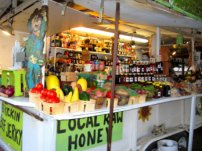
HomePage
Definitions
The Importance of Organic Foods
Breakfast for Champions
Lunch Box Ideas
Baby Comforts
Family Health Maintenance
Hygiene/Bath Essentials
Moms' Corner
Toxic Chemicals in Everyday Products
Natural Alternatives to Toxins
Recommended Reading
Assemblies For School or Organization
Individual Consultations
Who We Are
Have a great
green company or product?
Know how to save the world?
Do you inspire children?
Then, Link To Us
Keep our website online!
Please
donate $1
if you appreciate
our mama advice.
"Nothing speaks more loudly to a child than a good parent's quiet example"
--Life's Little Treasure Book On Parenting
"How to really love a child--Say yes as often as possible, Bake a cake and eat it with no hands. Bang on pots and pans. If the children are crabby, put them in water. Plan to build a rocketship. Surprise them. Hug trees together. Make lots of forts with blankets. Say "no" when necessary. Mail letters to God. Plant licorice in your garden. Paint their tennis shoes. Express your love. A lot."
---Sark
This is my garden. I'll rake it with care.
And then some flower seeds I will plant there.
The sun will shine. And rain will fall.
And my garden will blossom and grow straight and tall.
--Christian David
Kindergarten Scientist
Organic Musts!
17 Most Important Foods to Eat Organic
Wouldn't it be great if the food we ate was safe,
healthy,
free from pesticides
and affordable?
We deserve to be able to purchase safe and healthy food, especially for
developing children,
people seeking wellness
and expectant mothers,
but how?
Fight for the right!
Grow your own. It does not take a lot of space to begin to grow some of your very favorite vegetables, herbs or fruit. They just need sun, water and organic mulch. Do not use pesticides or chemicals on your plants. These are poison, to the bugs and yourself. For natural ways to control pests from eating the fruits of your labor, click here.-->
Request your local supermarket carry natural and organic foods. Demand that their growers and distributors label foods that have been genetically modified.
Shop at local farms stands., Buy fresh, in-season organic produce. In season = in-sync with your body. Local = Less Gas, Less Cost.
Purchase your foods from markets that specialize in organic foods. Some of these markets are Whole Foods, Jimbo's, Henry's, Trader Joe's, CSA programs, in your own community, organic food co-op's, farmer's markets, Diamond Organics.Com, Wild Oats, KidsOrganics.Com and Fresh-n-Easy.
When you have no other option but conventionally-grown produce, make sure you wash off any residual pesticides with Healthy Harvest, a non-ionic fruit and vegetable rinse, gentle on the earth, your produce and your self.

17 Most Important Foods to Eat Organic
- 1. Baby Food. The very young are extraordinarily susceptible to pesticides. Here are some organic baby food brands, Earth's Best, Tender Harvest, and Healthy Times, which are available for your baby's safety and health. Or better yet, make your own baby food by cooking and pureeing organic produce. See "Make Your Own Baby Food".
- 2. Strawberries. Enjoy them while they are in season from local organic farms or buy frozen organic strawberries from your local whole market.
- 3. Rice. Domestic rice has mega-doses of pesticides, and now, the chemicals companies are producing "pharm" rice a crop used to produce and store pharmaceuticals. Buy organic rice where you can find it! Store it in an airtight container. It stores very well.
- 4. Green and Red Bell Peppers. Super sources of Vitamin C, but wrought with pesticides if grown "conventionally". Buy organic, or, better yet, grow your own. Seeds of Change has a plethora of organic seeds, and pepper plants prove to be a hardy bunch!
- 5. Got Milk? We hope not, at least, not from conventionally raised cows. Today's commercial brands are loaded with antibiotics and growth hormones. Make sure your milk and other dairy is from organically-fed cows without the extra rBST, rBGH and antibiotics.
If you are feeding your child goat milk, and/or goat products, be aware that our science community has now genetically-mutated a goat to spin silk (yes, clothing silk) in her milk. See the New Scientist article.
- 6. Corn. Corn is typically not a scale tipper when it comes to pesticide residues. But, take into account that 75- 90% of all domestic corn has been genetically-modified, that the average American eats 11 pounds of it, that most cooking oils include corn oil, and that most everything is sweetened with corn syrup, and suddenly, buying organic corn and corn products, makes more than a little sense. Eat local organic corn in season and freeze some for later, or, leave some kernels to dry, and plant them in the spring.
- 7. Bananas. This tropical favorite has a short window of ripeness and a very long distance to market (quick, how many local banana farms does your town have?). All of which adds up to a lot of heavy chemical dousing along the way.
- 8. Green Beans. Over 60 different pesticides are used on green beans. Even beans used in baby food have been found to be contaminated.
- 9. Peaches. Nothing beats a peach. Until you realize that they often have the highest rates of illegally-applied pesticides. Isn't that just peachy . . .
- 10. Apples. A decade after the dangers of Alar were exposed, apples are still soaked in pesticides. Put only organic apples in your pie.
- 11. Cherries. Cherries, so expensive, so rich, so fabulous, . . . so heavily doused in poison. Make sure that the cherries in your Cherries Jubilee or Bing Cherry Ice Creams are as clean and wonderful as they were meant to be.
- 12. Celery. Why would anyone think of spraying the heck out of that innocuous little stem vegetable?! But they do. Stay organic, the taste of organic celery will amaze you and make you a celery-nibbler once again.
- 13. Apricots and Grapes. Apricots, Peaches and Grapes, what would summer be without them? Less toxic! Keep conventionally grown fruits and veggies, and their pesticide residuals, out of your system or minimize them with a vegetable rinse, such as the one by Healthy Harvest.
- 14. Soybeans.
If you are not yet a label-reader, it is time to start.
Everything you buy, from bread to cookies to crackers to margerine to dry mixes, has some sort of soy product in it. Most soybean in the USA is genetically-modified.
So, why the fuss over modified soy?
Monsanto, in an effort to increase the use (and profit potential) of Round-Up Ready, spliced the herbicide into soybean plant DNA. Two problems with this action.
- 1) No matter what you or I do, we can never wash RoundUp Ready herbicide off the soybean--ever. It is "permanently imbedded".
2) It appears that soy increases production of estrogen. High estrogen levels facilitate the potential for contracting various cancers and for hastening puberty in young children.
The jury is still out on whether soy consumption, in general, is beneficial, or whether only fermented soy should be consumed, Never, we mean NEVER, consume foods laced with poisons.
- 15. Potatoes.
Mashed potatoes are delicious and worth the calories, unless they're laden with pesticides or have been genetically-modified.
When genetically modified, potatoes impair the immune system and shrink the brain, liver and heart.
So, mash a clean, real, organic potato and forgo the new-fangled monstrosity.
Got soft, green-sprouting organic potatoes? Don't throw away those sprouting, wrinkly potatoes,bury them! They will grow wonderful potato plants! To get more of a yield, quarter the "old" potatoes before you plant them and you will get FOUR new potato plants! :)!
- 16. Raisins.Concentrated little grapes, concentrated levels of pesticides.
- 17. Cucumbers. Ever wonder why this delicious crisp vegetable was loosing its appeal on your palate? Yep! The answer is, once again, pesticides. The answer to pesticides, is, once again, go organic, or grow your own. :) Love you!
For foods to avoid that have been genetically-altered.
Modified from: The Green Guide, a newsletter published by Mothers and Others, 40 W. 20th Street, New York, NY 10011-4211, phone:888-ECO-INFO, e-mail:greenguide@mothers.org and/or log onto their website at www.mothers and others for a liveable planet.org

Question genetically-modified foods
Drink out of glass or enamel glasses or cups
Buy and use natural or organic products >
>
50 Harmful Effects of GM Foods
When things don't make any sense at all,
look for the money trail . . .
Buy organic, free-trade, shade-grown coffee.
Keeps the 30 pesticides out of your body, keeps the farmers fed, and keeps the rainforests growing.
Beware of
Pharm Crops near you, then fight to "put a lid on them"!
Avoid irradiated foods

